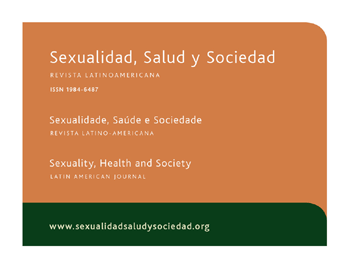| 80 |
Carlos: |
Vitória >me diz uma coisa< |
|
| 81 |
|
(0.3) |
|
| 82 |
Carlos: |
°é:::° como é que você chegô a- a- a:::: |
|
| 83 |
|
<conclusão> que você::::: >apresenta< um |
|
| 84 |
|
transtorno de::: [>identidade de gênero?<] |
|
| 85 |
Vitória: |
[é:: desde os sete anos] de |
|
| 86 |
|
i↑dade eu::: criava muito assim na hora de |
|
| se |
|
|
|
| 87 |
|
vesti, tinha umas camisetas que eu usava, |
|
| 88 |
|
fazia feito um maiô↓ .hhh depois aos doze |
|
| 89 |
|
anos de idade >eu comecei a me vesti< usava |
|
| 90 |
|
as roupas da minha mãe::, prima:: né >não |
|
| 91 |
|
tinha irmã< |
|
| 92 |
|
(.) |
|
| 93 |
Vitória: |
e:::::::::::- e sempre tive uma tendência:: |
|
| 94 |
|
a gostá de ↑tudo que era coisa de mulher né, |
|
| 95 |
|
nas brincadeiras >eu não soltava pipa< não |
|
| 96 |
|
jogava [↑bo::la] |
|
| 98 |
Carlos: |
[cê se] senti::a diferente dos outros |
|
| 99 |
|
rapazes? [>dos outros garotos?<] |
|
| 100 |
Vitória: |
[ah::::: sim↓ sempre] sempre↓ eu |
|
| 101 |
|
preferia sempre o contato com as mulhe::res, |
|
| 102 |
|
>com as meninas< mais que dos rapazes, esse |
|
| 103 |
|
negócio às vezes de i a clu:::be assim, |
|
| 104 |
|
piscina e tê que trocá de roupa na frente |
|
| 105 |
|
dos home >eu nunca gostei disso< [eu sempre-] |
|
| 106 |
Carlos: |
[enten di↓] |
|
| 107 |
|
(.) |
|
| [...] |
|
|
|
| 226 |
Carlos: |
=entendi, e::: durante o:: s- o seu na
mo ro |
|
| 227 |
|
agora com seu- seu atual namorado↓ |
|
| 228 |
|
(.) |
|
| 229 |
Carlos: |
.hh é:::: com relação a::- a- a- ao namo↓ro, |
|
| 230 |
|
você tá usando- você u sa o pênis?= |
|
| 231 |
Vitória: |
=não↓ >não [uso< não, não uso] |
|
| 232 |
Carlos: |
[você não faz- não] usa?= |
|
| 233 |
Vitória: |
=não, não uso↓= |
|
| 234 |
Carlos: |
ta [bom↓] |
|
| 235 |
Vitória: |
[eu] não uso e::::::- |
|
| [...] |
|
|
|
| 243 |
Carlos: |
=você conse]gue ficá:::[:: >ereto<] |
|
| 244 |
Vitória: |
=penso nele-] |
[exatamente] isso↓ |
| 245 |
Carlos: |
entendi, você::: <quando se ↑olha> no espelho |
|
| 246 |
|
e olha seu::- seu genital↓ se nota alguma |
|
| 247 |
|
coisa? cê- >cê fica [constran gi do?<] |
|
| 248 |
Vitória: |
|
[é eu fico numa] situação |
| 249 |
|
meio desagradável, [>situação ruim<] |
|
| 250 |
Carlos: |
|
[é desagradável] |
| 251 |
Vitória: |
é= |
|
| 252 |
Carlos: |
=você acha desagradável tê:::- tê o pênis= |
|
| 253 |
Vitória: |
=é, >eu acho<= |
|
| 254 |
Carlos: |
=cê acha= |
|
| 255 |
Vitória: |
=mas eu não sei se eu fari::a a::: >cirurgia< |
|
| 256 |
|
de <<redesignação>> sexual, isso eu ainda não
|
|
| 257 |
|
me defini, |
|
| 258 |
Carlos: |
ººperfe[itoºº] |
|
| [... ] |
|
|
|
| 646 |
Carlos: |
<<infelizmente>> infelizmente >mas assim< é |
|
| 647 |
|
um programa longo↓ [não] precisa ↑pressa agora |
|
| 648 |
Vitória: |
|
[uhum] |
| 649 |
Carlos: |
>cê ta entendendo?< [é::]: tu do são
novidades= |
|
| 650 |
Vitória: |
|
[uhum] |
| 651 |
Carlos: |
=cê ta sendo (visto) de coisas [que cê nunca= |
|
| 652 |
Vitória: |
|
[é:: eu tenho= |
| 653 |
Carlos: |
=imaginô↓] |
|
| 654 |
Vitória: |
=lido mu i]to também::: [ô:::]: >Carlos<
eu= |
|
| 655 |
Carlos: |
|
[isso] |
| 656 |
Vitória: |
=leio mu ito pela inter↑net, [muita maté::ria] |
|
| 657 |
Carlos: |
|
[não precisa cê] |
| 658 |
|
tê ↑pressa disso não↓ você:::: >assim< fica |
|
| 659 |
|
tranquilo que::: é::: a diferença de u m mês |
|
| 660 |
|
pra quatro meses >de diferença< pa↑rece ↑sê:: |
|
| 661 |
|
>mas ↑cê vai vê< é rápido= |
|
| 662 |
Vitória: |
=é= |
|
